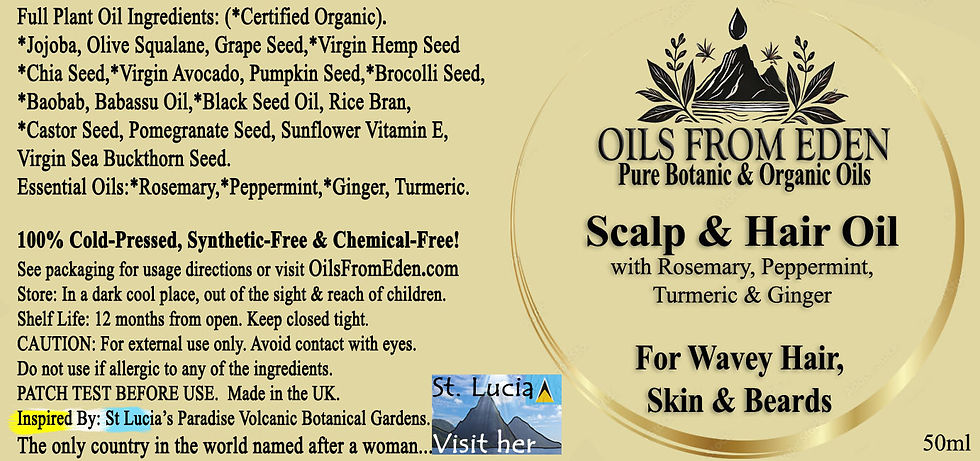Uncovering the Truth: The Hidden Dangers of Soya Bean Oil in Hair, Skin, and Beard Products
- garryherbert
- Oct 31, 2024
- 4 min read
Soya bean oil is a common ingredient in many hair, skin, and beard care products today. Its popularity comes from its perceived benefits, mainly its cost-effectiveness as a moisturizing agent. But as more consumers look closely at product ingredients, it’s crucial to consider the potential risks associated with soya bean oil. At OilsfromEden, we are dedicated to offering high-quality blends that exclude soya bean oil, promoting safer, more natural self-care choices. In this blog post, we will explore the hidden dangers of soya bean oil in beauty products and discuss why it’s essential to choose healthier alternatives.
Understanding Soya Bean Oil
Soya bean oil is extracted from soybean seeds. While often used in cooking, its emollient properties make it a popular choice in cosmetic formulations. It is high in polyunsaturated fatty acids, which can help improve skin texture. However, the extraction process typically involves high heat and chemical solvents, resulting in potentially harmful byproducts, making it necessary to weigh both benefits and risks when considering its use.

The Link to Allergies and Sensitivities
One major factor to be aware of is that soya bean oil can cause allergic reactions in some people. In 2023, a study found that roughly 0.4% of the U.S. population has a soy allergy, meaning many individuals may be unknowingly reacting to beauty products containing soya bean oil. Symptoms can range from mild redness and rash to severe reactions like swelling or hives. By avoiding soya bean oil, individuals can reduce their risk of experiencing these negative reactions.
Hormonal Disruption Concerns
Another significant concern with soya bean oil is its phytoestrogens, which can mimic estrogen in the body. According to a study published in the Journal of Clinical Endocrinology & Metabolism, high levels of phytoestrogens might lead to hormonal imbalances that could potentially contribute to health issues such as reproductive problems and some hormone-related cancers. Although regulatory bodies deem soya bean oil safe in small amounts, regular exposure through personal care products can lead to cumulative effects that consumers need to address by opting for safer oils.
Comedogenic Properties
Soya bean oil has a comedogenic rating of 3 on a scale of 0 to 5, indicating a moderate likelihood of clogging pores. For many, this means increased breakouts and exacerbated skin conditions, especially for individuals with oily or sensitive skin. Choosing non-comedogenic alternatives like jojoba oil or grape seed oil can help avoid these risks, leading to clearer and healthier skin.
Nutrient Diversity
A critical reason to avoid soya bean oil is its lack of diverse nutrients when compared to natural alternatives. For instance, oils like jojoba and argan oil are abundant in vitamins, antioxidants, and essential fatty acids. Jojoba oil, rich in vitamins E and B, helps balance oil production, while argan oil provides significant moisture and protection against heat styling. In contrast, soya bean oil may leave users wanting more in terms of nourishment, which is why OilsfromEden emphasizes using diverse, nutrient-rich ingredients in our products.
Environmental Impact
The production of soya beans significantly impacts the environment. Large-scale soybean farming is often linked to deforestation, loss of biodiversity, and soil depletion. According to the World Wildlife Fund, about 1.5 million square kilometers of rainforest have been lost to soybean cultivation. Eco-conscious consumers should consider this environmental toll when selecting beauty products. By choosing brands that avoid soya bean oil, you can support sustainable practices and contribute to a healthier planet.
The OilsfromEden Promise
At OilsfromEden, we proudly offer hair, skin, and beard blends free from soya bean oil. Our commitment to quality means every product is made with safe, natural ingredients. We carefully select oils known for their beneficial properties and ensure our formulations enhance product efficacy while maintaining safety. This dedication aligns with our mission of transparency and consumer education.
Alternatives to Soya Bean Oil
Elevate your self-care routine by exploring reliable alternatives to soya bean oil. Here are several natural oils that can enhance hair, skin, and beard health:
Jojoba Oil
An excellent choice for all skin types, jojoba oil closely resembles sebum, the skin's natural oil. It balances oil production and is rich in vitamins E and B.
Argan Oil
provides deep nourishment. It is loaded with essential fatty acids and antioxidants, making it particularly effective for moisturizing hair and enhancing shine.
Incorporating Safe Practices
When selecting hair, skin, and beard products, it’s vital to scrutinize ingredient labels. Seek out products labeled as "free from soya bean oil" to promote safer alternative choices. Moreover, take the time to educate yourself about ingredients that may be harmful. Knowledge empowers you to make informed decisions aligned with your health and values.
The Role of Consumer Awareness
As consumers grow more aware of their product choices, the demand for transparency in beauty products is rising. Brands that prioritize ingredient safety and ethical practices will lead this shift in the industry. By choosing products that exclude soya bean oil in favor of natural alternatives, you can drive change in the market and encourage other companies to embrace health and sustainability.
Final Thoughts
While soya bean oil has its advantages, the hidden dangers associated with its use in hair, skin, and beard products should not be ignored. From allergic reactions and hormonal disruption to environmental concerns, the risks are significant. At OilsfromEden, our commitment to offering blends without soya bean oil showcases our dedication to quality, safety, and effectiveness.
By integrating natural alternatives into your self-care routine, you can enhance your well-being while supporting a more ethical beauty industry. Choosing the right ingredients can transform how you care for your hair, skin, and beard. Embrace the movement towards safer, healthier products, and elevate your self-care experience today.




Comments